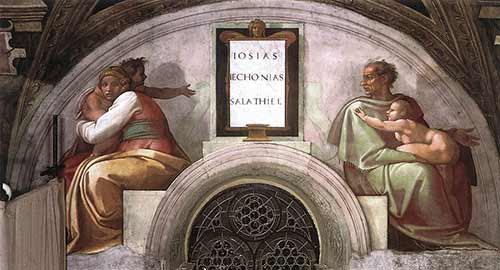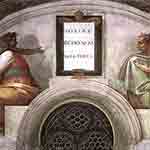
And after the deportation to Babylon: Jechoniah was the father of Salathiel, and Salathiel the father of Zerubbabel (Matthew 1:12)
μετὰ δὲ τὴν μετοικεσίαν Βαβυλῶνος Ἰεχονίας ἐγέννησεν τὸν Σαλαθιήλ Σαλαθιὴλ δὲ ἐγέννησεν τὸν Ζοροβάβελ
This is the eighth post in a series – you can begin here:
Matthew in Slow Motion 1
Matthew in Slow Motion 2
Matthew in Slow Motion 3
Matthew in Slow Motion 4
Matthew in Slow Motion 5
Matthew in Slow Motion 6
Matthew in Slow Motion 7
As this year the Sunday Gospel readings’ focus is on St Matthew’s Gospel, I thought I’d start some of my personal study and Lectio Divina with that Gospel. [NB. I am using ‘Matthew’ as a convenient term for the author of the first Gospel in the order of the Christian canon].
Jechoniah – It seems that Jechoniah died in Babylon in the exile (see Jer 52:34). 1 Chronicles 3:17 calls him, “Jeconiah, the captive”. He was one of the evil kings (2 Kings 24:8-9; 2 Chronicles 36:9).
none of his offspring shall succeed
in sitting on the throne of David,
and ruling again in Judah.
Hence, Matthew’s including of Jeconiah in the genealogy of Jesus seems yet another invalidation of Jesus being the King. We have seen other examples of this in previous posts in this series.
Jechoniah was the father of Salathiel – says Matthew – and Salathiel the father of Zerubbabel
The Hebrew of 1 Chronicles 3:17-19 has
and the sons of Jeconiah, the captive: Shealtiel his son, Malchiram, Pedaiah, Shenazzar, Jekamiah, Hoshama, and Nedabiah; The sons of Pedaiah: Zerubbabel and Shimei; and the sons of Zerubbabel: Meshullam and Hananiah, and Shelomith was their sister
וּבְנֵי יְכָנְיָה אַסִּר שְׁאַלְתִּיאֵל בְּנֹֽו׃
וּמַלְכִּירָם וּפְדָיָה וְשֶׁנְאַצַּר יְקַמְיָה הֹושָׁמָע וּנְדַבְיָֽה׃
וּבְנֵי פְדָיָה זְרֻבָּבֶל וְשִׁמְעִי וּבֶן־זְרֻבָּבֶל מְשֻׁלָּם וַחֲנַנְיָה וּשְׁלֹמִית אֲחֹותָֽם׃
So, according to this Hebrew text, Jeconiah was the father of Shealtiel. But Shealtiel was NOT the father of Pedaiah. In the Hebrew text, Shealtiel and Pedaiah are brothers. Shealtiel, hence, is the uncle of Zerubbabel (not as Matthew has it). Jeconiah is the father of Pedaiah and Pedaiah is the father of Zerubbabel.
Ezra 3:2,8; 5:2; Nehemiah 12:1; Hagai 1:1,12,14; 2:2,23, however, have Shealtiel as the father of Zerubbabel. And the Septuagint alters 1 Chronicles 3:17-19 to this. And Matthew is, hence, following the Septuagint list:
17 καὶ υἱοὶ ᾿Ιεχονία· ᾿Ασίρ, Σαλαθιὴλ υἱὸς αὐτοῦ, 18 Μελχιρὰμ καὶ Φαδαΐας καὶ Σανεσὰρ καὶ ᾿Ιεκεμία καὶ ῾Ωσαμὰθ καὶ Ναβαδίας. 19 καὶ υἱοὶ Σαλαθιήλ· Ζοροβάβελ καὶ Σεμεΐ. καὶ υἱοὶ Ζοροβάβελ· Μοσολλὰμ καὶ ᾿Ανανία καὶ Σαλωμεθὶ ἀδελφὴ αὐτῶν
17 And the sons of Jechonias; Asir, Salathiel his son, 18 Melchiram, and Phadaias, and Sanesar, and Jekimia, and Hosamath, and Nabadias. 19 And the sons of Phadaias; Zorobabel, and Semei: and the sons of Zorobabel; Mosollam, and Anania, and Salomethi [was] their sister.
Zerubbabel is the last in Matthew’s list for whom there is Old Testament mention. For all the rest in Matthew’s list, he is not using the Old Testament as a source.
Zerubbabel was the leader of the first group returning to the Holy Land. He was the governor of Judah under the Persian King Darius I (Ezra 3:2; 5:2). See also Sirach 49:11:
How shall we magnify Zerubbabel?
He was like a signet ring on the right hand
To be continued…
If you appreciated this post, consider liking the liturgy facebook page, using the RSS feed, and/or signing up for a not-very-often email, …



